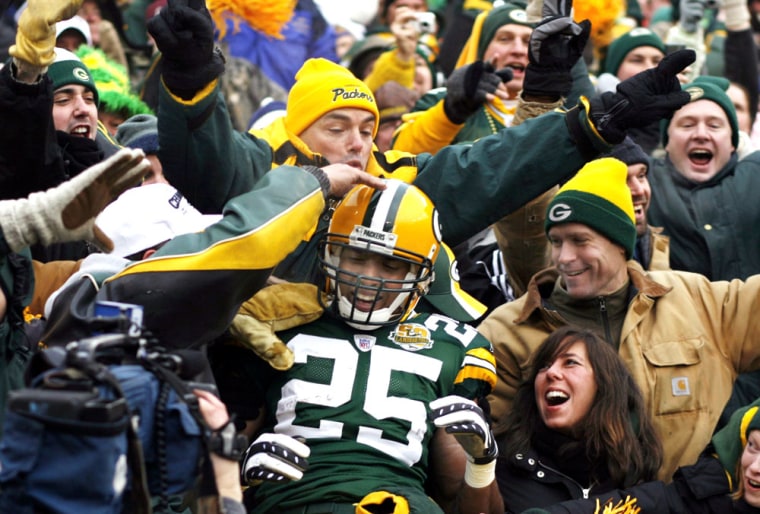The Brat Stop in Kenosha, Wis. — a three-hour drive from Green Bay — was overflowing with Packer fans before last Saturday’s playoff game against Seattle.
A blonde girl, bedecked in a Brett Favre jersey, played hide-and-seek with her brother, sporting a Packers’ sweatshirt. A baby girl nearby wore green-and-yellow gear from head to toe. When a waitress was asked if Bears’ merchandise or Packers’ merchandise sold better at the sprawling restaurant — after all, Chicago is much closer than Green Bay, a little more than an hour away — she put her hands about six inches apart to signify the sales of Bears’ stuff. Packers? Her hands were about two footballs apart.
At the upscale American Club in Sheboygan, Wis., the scene was similar that day. A limousine full of Packers fans draped in requisite jerseys disembarked in front of the hotel. Inside, a clerk worried that the Packer defense might “play lazy” during the game.
Among the scores of those fervid Packer fans in Kenosha and Sheboygan, a few likely were owners of the franchise. The Packers — a publicly owned corporation since the Harding Administration — boast more than 112,000 stockholders, a stunning amount, considering the population of Green Bay is a shade above 100,000.
Though the majority of sports franchises in the United States are owned by a group of private investors, with one serving as the public face, control of the Green Bay Packers is divvied into about 4.7 million shares with no chance of anyone taking over. No person can buy more than 200,000 shares. Four stock sales have priced shares from $5 in 1923 to $200 in 1997 — the last one helped increase the capacity of Lambeau Field by 10,000 seats.
Despite their popularity, the Packers’ stock would never be touted by brokers. In 85 years, a dividend has never been paid and the stock does not appreciate in value. Shares can only be sold back to the team, and then at a fraction of the original purchase price. Who would ever assign a buy rating with that kind of historical return?
Yet shareholders would not trade their illiquid investment for anything. Who can beat the annual meeting? In 2006 and 2007, owners could gather in the summer at Lambeau Field (general admission seating) to hear about the state of the non-profit company. Concession stands were open, private boxes were toured and — even though the meeting started at 10 a.m. — Curly’s Pub didn’t close until 12 hours later. Even Warren Buffett can’t offer such amenities.
Somehow, despite an ownership setup unique in the NFL, it all works — in fact, flourishes. The Packers offer more luxury suites, 166, than all but a handful of NFL teams. This season, the Packers averaged more than 70,000 fans a game, 97 percent of Lambeau’s capacity. They are one of the top 10 NFL teams in terms of generating revenue, gathering more than $200 million in their last fiscal year. In addition, the Green Bay season-ticket wait list, at around 75,000 names, could fill Lambeau Field on its own with enough left over for a bustling tailgate party in the parking lot.
When the names of Packer shareholders are published, the list can almost seem comical. According to a Milwaukee Journal-Sentinel report ahead of the last stock sale in 1997, television personality Arthur Godfrey once owned a share. A commerce secretary in the Nixon Administration also possessed a share (though there is no doubt his boss, who once called in a play to Washington Redskins coach George Allen, would have enjoyed it more). Cincinnati-based Procter & Gamble — best known for selling products from Crest toothpaste to Bounty paper towels — held 80 shares because a Green Bay company that originally owned them was bought by another firm, which Procter & Gamble ultimately purchased.
So when ageless quarterback Brett Favre leads his team against the New York Giants this Sunday, the Packer faithful will again unite across Wisconsin. With more than 65,000 shareholders living in that state alone, they will be looking for the best return on investment they can imagine — a trip to the Super Bowl.
